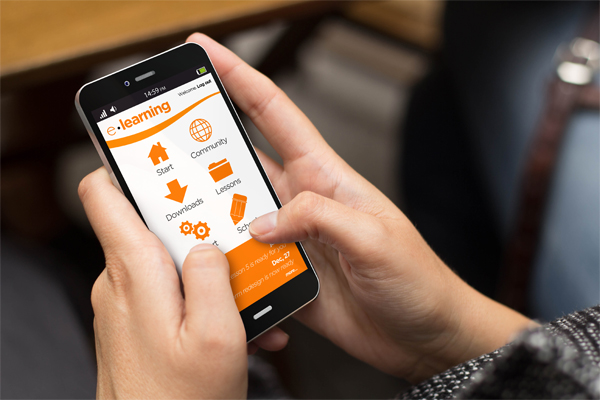This week, Dr. Scott Hamm, instructor for the new workshop, Strategies for Effective Mobile Learning in the Online and Blended Classroom, joins us to discuss the importance of mobile learning in education, as well as a variety of other topics.

OLC: There are many opportunities to teach online. Why did you choose OLC and which Institute course(s) do you teach for OLC?
I chose the OLC because of the relationships and excellence of their professional development offerings. I have taught for other professional development organizations, but the OLC has a high level of competence and quality. They are the industry standard, and I absolutely love the quality of the people and the product. I have taught several different workshops, and my specialty is Mobile Learning. Related to this topic, I currently facilitate the Strategies for Effective Mobile Learning in the Online and Blended Classroom workshop, and the Mobile Learning Mastery Series.
OLC: What should participants know when taking this workshop?
Mobility continues to increase in the availability of devices, usage among all age groups, and as the preferred manner of consumption of digital content for ages 18 – 29. As a result, the strategic implementation of mobility in online, blended, and face-to-face learning environments has shifted from becoming a novelty or attractional device used to recruit students to becoming one of the tools that student bring to their learning with an increased expectation of integration and engagement from their institution.
OLC: What changes can we expect to see over the next 3-5 years in teaching and learning as a result of mobile learning?
Mobile devices are the portal for personalized learning for students that offer anytime, anywhere access to their learning and life management. In 2016, StatCounter reported that the majority of web browsing took place via mobile smartphones and tablets. Google is reconfiguring their search engine to accommodate mobile search first and desktop traffic second. As the traditional student’s life situation becomes more of a blend between work, school, and life events, the necessity of accessing the LMS and university services through a mobile device is vital. Hanover Research reported in a survey of over 2,600 students that nearly two-thirds reported using their smartphones to study. With a predicted 36% annual growth for mobile learning predicted, the implications for higher education mean mobile integration should be a necessary and strategic part of their approach. The one-stop-shop campus app will continue to grow to accommodate campus services and reduce the risk of having too many campus apps which compete with the 6 – 8 app range that most people will accommodate. Mobile introduces more opportunities for student-instructor interaction, and the research concerning the impact of mobile integration will continue encourage higher education institutions to invest time and energy to integrate mobile learning into instructional practices. As a result, faculty will continue to need assistance with technical and pedagogical integration, and teaching and learning centers will continue to be integral in bridging the gap from legacy to new teaching and learning practices.
OLC: What projects are you engaged in that have to do with mobile learning?
I am currently involved in several projects. We are developing a survey for the Abilene Independent School District in Abilene, TX to establish baseline user habits for high school juniors and seniors. The aim is to coordinate the mobile experience of first year students at Hardin-Simmons to mitigate usage disequilibrium and create a more effective learning pathway from high school to the first-year experience. Another project that has been very transformative for our campus is in its fourth year — a longitudinal campus survey of student mobile user habits and impact on student engagement to content and instructor. Our theoretical base for our online programs is a modified community of inquiry model. We started studying our student user habits and aligning with intentional pedagogy in Fall 2014. As a result, we have made adjustments to our help desk response, campus broadband, device distribution, and pedagogical implementation in our face to face, blended, and online courses. We have been correlating this data with our annual scores for the National Student Engagement Survey scores to align our usage with pedagogy and increase student engagement. Another effort is determining key variables in the persistence of second year students through strategic communication and engagement using our campus mobile app. Isolated variables are LMS, student service, FAFSA alerts, select mobile communications, and student services and club interaction to determine outcomes of student engagement, persistence, FAFSA completion, club participation, and NESSY engagement scores. Among other projects, one that we believe is integral to student to content engagement is examining student opt-in percentage and course satisfaction scores using opt-in data for mobile assignment in an online course.
OLC: How do you define innovation?
To me, I define innovation in retrospect. I look at it and say, “That. That was innovative.” What causes me to say that is there was usually a personal and communal process that achieved an outcome, a new way of doing or expressing something with a tool, process, or vision the establishes a new path and offers hope to everyone who is looking to reimagine a new path.
OLC: What do you believe are the top 3 ways in which professionals in our field can stay current and move ahead?
Relationships, Research, and Reflection. Collaborating with an intellectual community is invaluable. Research and taking action regarding evidence-based processes move our field forward, and personal and corporate reflection is needed to continue to refine our findings and provide a balance for praxis.
OLC: How can people connect with you?
Twitter: @ScottEHamm
About Dr. Scott Hamm

Scott is the Director of Online Education at Hardin-Simmons University, Abilene, Texas. He is the former Director of Mobile Learning Research in the Adams Center for Teaching, Learning, & Technology at Abilene Christian University. Scott teaches the Mobile Learning Mastery Series and other workshops for the Online Learning Consortium. Additionally, he teaches in the Graduate Education program at Abilene Christian University, the Graduate Educational Technology program at Fresno Pacific University, and in the Graduate Education Department at Hardin-Simmons University. His participation in the Educause Breakthrough Models Academy has led to Succeed You, a project funded by Avenue Scholars Foundation, Omaha, NE that is providing a mobile solution to developmental high school math students. He recently directed a Gates Foundation Grant (Next Generation Learning Challenges) studying Mobile Enhanced Inquiry Based Learning with the California University of Pennsylvania and Del Mar College. In October, Scott received the 2014 OLC Effective Practice Award for his research on using text-messaging in online and face-to-face classes to increase learning outcomes and engagement. Scott was recently named as one of the top 100 educators in Texas to follow on Twitter.
Scott did his undergraduate work in rehabilitation education at the Pennsylvania State University, graduate work in Religious Education at Abilene Christian University and received Doctorate in Educational Ministry at the Southwestern Baptist Theological Seminary in Ft. Worth, 2006. He is currently a Ph.D. student at Nova Southeastern University in Information Systems.
In his spare time, Scott likes to collect vinyl (old records) and restore vintage stereos. Recently, he restored his Radio Shack Clarinette 97 record player/8-track stereo system and is “spinning vinyl” on it again.

